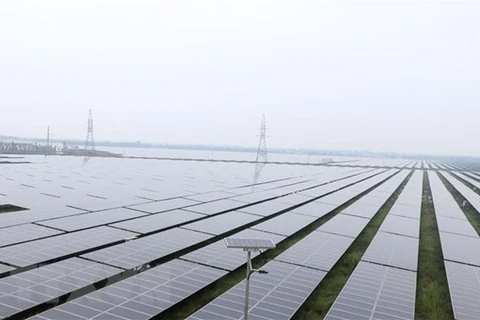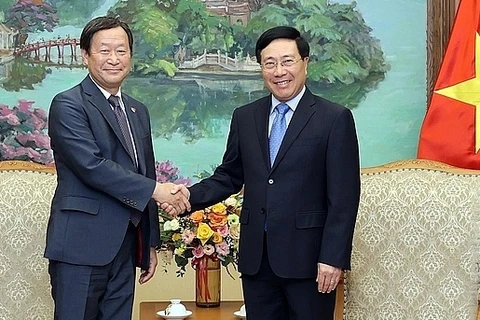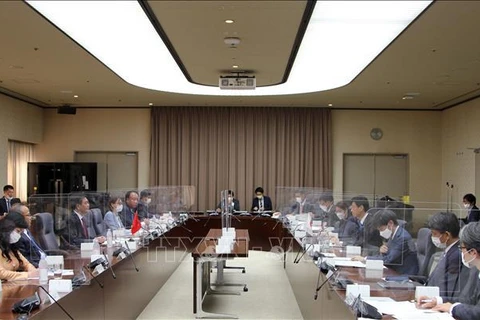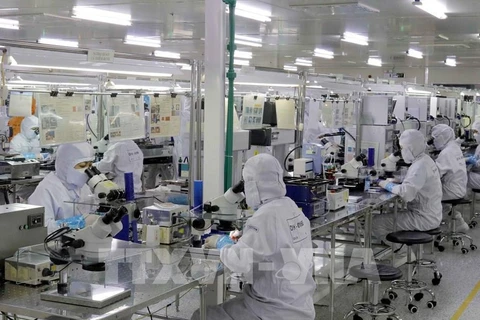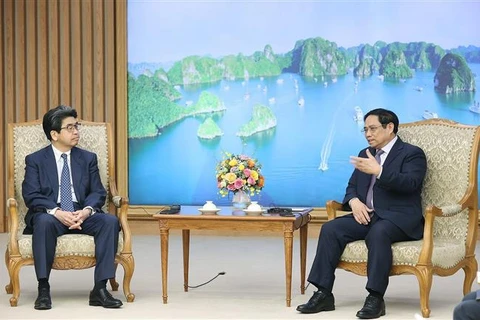Hanoi (VNA) – Various Japanese enterprises are planning to expand their investment in Vietnam, where business insiders of Japan assess as the second most attractive investment destination after the US, according to Chief Representative of the Japan External Trade Organisation (JETRO) Najakima Takeo in Hanoi.
Addressing a recent conference, Takeo said although Japan’s direct investment into Vietnam declined in the first half of 2022, it still posted impressive growth of over 59% in 2021 and over 45% this year, the highest rate among the members of the Association of Southeast Asian Nations (ASEAN).
A JETRO survey in 2021 revealed that 55% of the Japanese firms in Vietnam were planning to expand operation and paying more attention to value-added products. Another of over 1,700 Japanese companies by this organisation also showed that Vietnam is second only to the US in terms of investment attractiveness.
In an interview granted to “The World and Vietnam” newspaper last May, JETRO CEO Sasaki Nobuhiko highlighted the growing number of Japanese businesses in Vietnam, with about 2,000 firms at present. The Northeast Asian country is investing 64.5 billion USD into 4,935 projects here.
He noted that Vietnam is the third largest importer of Japanese products while Japan ranks fourth among Vietnam's export markets.
 The Japanese-invested THACO MAZDA car production line in the Chu Lai Open Economic Zone in Quang Nam province (Photo: VNA) Explaining Vietnam’s attractiveness to Japanese firms, Governor of the Japan Bank for International Cooperation (JBIC) Hayashi Nobumitsu hailed Vietnam’s efforts to maintain macro-economic stability and described the country as a magnet for Japanese investors.
The Japanese-invested THACO MAZDA car production line in the Chu Lai Open Economic Zone in Quang Nam province (Photo: VNA) Explaining Vietnam’s attractiveness to Japanese firms, Governor of the Japan Bank for International Cooperation (JBIC) Hayashi Nobumitsu hailed Vietnam’s efforts to maintain macro-economic stability and described the country as a magnet for Japanese investors.
Vladimir Kolotov, Director of the Ho Chi Minh Institute at Russia’s Saint Petersburg State University, said the political stability, the transparency and predictability of the investment environment, the gradual opening of some economic sectors to foreign investors, and the legal foundation perfection are all factors benefiting foreign investors in Vietnam.
Another strong point is the young population, nearly 45% of which are aged between 25 - 54 and another 17.8% between 15 - 24, he noted, adding that Japan has received tens of thousands of Vietnamese students and trainees who have also come to work for Japanese companies after returning to the homeland.
Vietnam is actively integrating into global production chains, which is benefiting from favourable conditions thanks to the presence of major multinationals, including automobile giants from Japan, Kolotov went on./.
Addressing a recent conference, Takeo said although Japan’s direct investment into Vietnam declined in the first half of 2022, it still posted impressive growth of over 59% in 2021 and over 45% this year, the highest rate among the members of the Association of Southeast Asian Nations (ASEAN).
A JETRO survey in 2021 revealed that 55% of the Japanese firms in Vietnam were planning to expand operation and paying more attention to value-added products. Another of over 1,700 Japanese companies by this organisation also showed that Vietnam is second only to the US in terms of investment attractiveness.
In an interview granted to “The World and Vietnam” newspaper last May, JETRO CEO Sasaki Nobuhiko highlighted the growing number of Japanese businesses in Vietnam, with about 2,000 firms at present. The Northeast Asian country is investing 64.5 billion USD into 4,935 projects here.
He noted that Vietnam is the third largest importer of Japanese products while Japan ranks fourth among Vietnam's export markets.
 The Japanese-invested THACO MAZDA car production line in the Chu Lai Open Economic Zone in Quang Nam province (Photo: VNA)
The Japanese-invested THACO MAZDA car production line in the Chu Lai Open Economic Zone in Quang Nam province (Photo: VNA) Vladimir Kolotov, Director of the Ho Chi Minh Institute at Russia’s Saint Petersburg State University, said the political stability, the transparency and predictability of the investment environment, the gradual opening of some economic sectors to foreign investors, and the legal foundation perfection are all factors benefiting foreign investors in Vietnam.
Another strong point is the young population, nearly 45% of which are aged between 25 - 54 and another 17.8% between 15 - 24, he noted, adding that Japan has received tens of thousands of Vietnamese students and trainees who have also come to work for Japanese companies after returning to the homeland.
Vietnam is actively integrating into global production chains, which is benefiting from favourable conditions thanks to the presence of major multinationals, including automobile giants from Japan, Kolotov went on./.
VNA

